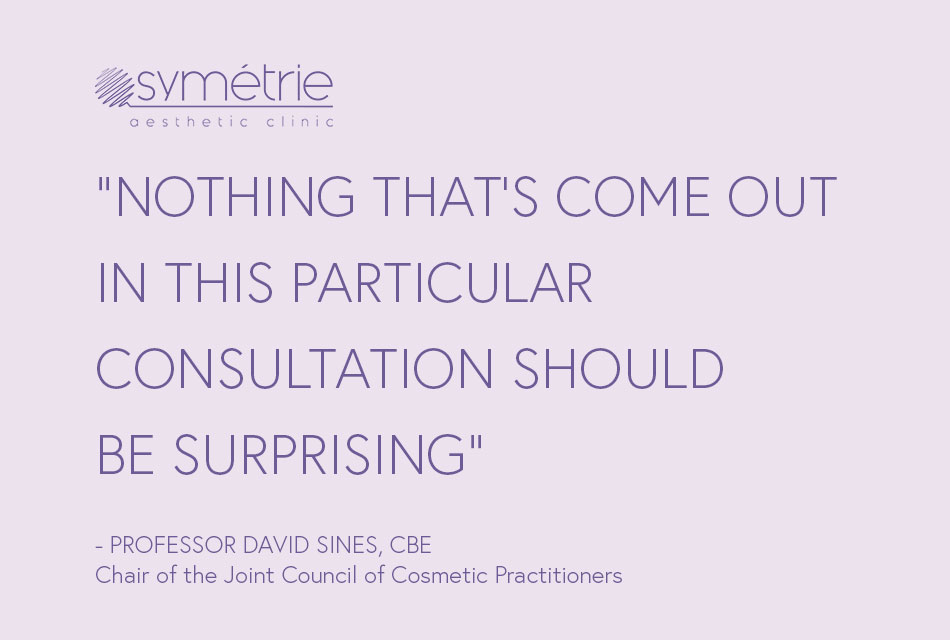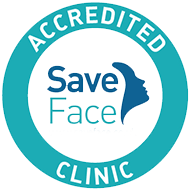
We at Symetrie have always been big proponents of safe, regulated and responsible aesthetic non-surgical cosmetic clinics for here in England.
Unfortunately we have during our years of practise, seen and helped rectify the results of aesthetic treatments that have been delivered to persons by unregulated clinics and irresponsible practitioners who may not have had any professional healthcare or medical professional qualifications or experience.
Thankfully this looks like the situation is due to change, something we wholeheartedly support, with the publishing of the long awaited aesthetics licensing scheme proposal which has recently been released. This details the plans for aesthetics regulation, published on the Department of Health & Social Care (DHSC) website, and confirms that the government will be introducing a legally enforceable licensing scheme.
Proposed Aesthetics Regulation For England
The government sets out in the report that, “The current regulatory framework places few restrictions on who can perform non-surgical cosmetic procedures…. We want to ensure public safety and public protection through a regulatory framework that enables consumers to make informed and safe choices when undergoing procedures which have the potential to cause serious injury or harm.”
It notes that, currently “competent practitioners who operate to high standards of best practice in relation to training, health and hygiene often find themselves in competition with practitioners and businesses with low levels of competence and who lack appropriate training in the procedures they offer.”
Stressing that “licensing will ensure consistent standards and protect individuals from the potentially harmful physical, emotional and psychological impacts of poorly performed non-surgical cosmetic procedures.”
Aims of the new aesthetics licensing scheme:
The government has stated the following aims for its new licensing scheme:
- “Identify the procedures that present a risk to the public
- Consist of 2 interlinked components: a practitioner licence and a premises licence
- Be administered and enforced by local authorities, who will work with a range of partners such as environmental health officers, trading standards officers and the Health and Safety Executive
- Make it an offence for an individual to carry out non-surgical cosmetic procedures without a licence
- Require those people who offer procedures to be suitably trained and qualified, hold appropriate indemnity cover, operate from premises which meet the scheme’s standards of hygiene, infection control and cleanliness
- Introduce a minimum age of 18 for those people seeking to receive the procedures licensed under the scheme.”
- “At the heart of this is the government’s statement that it intends to enforce a new licence for practitioners and a second, separate licence for premises,” says Prof. Sines. “That will come into play following consultation. And there will be more consultations next year as well.”
- The government has confirmed that the licensing scheme will be operated by local authorities.
Non-Surgical Cosmetic Procedures To Be RAG-Rated
Aesthetic procedures encompass so many different treatment types that the government is seeking to RAG-rate them. This means grouping them into categories of Red, Amber and Green (RAG).
Red-rated aesthetic procedures – high-level, high-risk procedures, ie,. liposuction, the breast, buttock augmentations etc. These are to be restricted to doctors or CQC-registered practitioners only to undertake. Thankfully there are very few back-street unlicensed people practising this type of medical procedure here in the UK.
Amber-rated aesthetic procedures – The issue of non-healthcare professionals working in medical aesthetics is certainly divisive. RAG-rating procedures to be included in the aesthetics licensing scheme is the approach the government has proposed to tackle this.
Professor Sines (Chair of the Joint Council of Cosmetic Practitioners) interprets these Amber rated procedures as,
“These are the ones that really penetrate the skin or relate to the use of a prescribed medicine. So it’s the injectable toxins, it’s the dermal fillers, the IV infusions. It’s the more invasive ablative lasers, the deeper, more penetrative chemical peels with a higher pH value. It also includes the weight loss injections, the hayfever injections – and I could go on and on, including plasma replacement therapy.”
“We believe they should be performed not just with a licence, but with the supervision of a healthcare professional. So there’s the big shift which is going to cause a lot of interest to members of the public.”
This is the area of which we at Symetrie fully support.
Tracy Butler who undertakes all our ‘Amber’ rated aesthetic procedures is a fully licensed and experienced Prescribing Nurse Practitioner, so highly regarded in her field that she has been responsible for training Doctors, Dentists and other healthcare professionals on the correct usage and administration of non-surgical aesthetic procedures.
Simply put, we believe that if a clinic or person is offering these type of medical non-surgical aesthetic procedures they must be undertaken or supervised by someone like Tracy, a qualified and experienced healthcare professional.
Green-rated aesthetic procedures – These are the many lower level procedures such as microneedling etc. These don’t require supervision but should still be carried out by a licensed clinic and practitioner.
Next steps…
This being the first stage of the consultation to the Aesthetics Licensing Scheme, a more steps need to be considered including:
- The procedures in scope
- Restrictions on which practitioners should be permitted to perform procedures
- Age restrictions for those undergoing such procedures.
Tracy and all the staff at Symetrie feel that this type of regulation could not come any sooner.
Which is why we already participate in the SAVE FACE scheme which is a national register of Accredited practitioners who provide non-surgical cosmetic treatments such as anti-wrinkle injections and dermal fillers. The Register is accredited by Professional Standards Authority and is recognised by the Government, The Department of Health, NHS England and The Care Quality Commission.
To read more about why we believe in the Save Face scheme and how they assessed Symetrie to be included in the register click on this link
For more information about the Aesthetics Licensing Scheme Proposal in more detail and a great video by Professor Sine, please visit: https://www.harleyacademy.com/aesthetic-medicine-articles/aesthetics-licensing-scheme-proposal-released/

